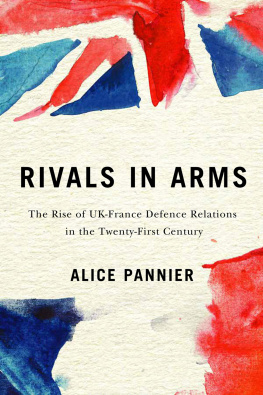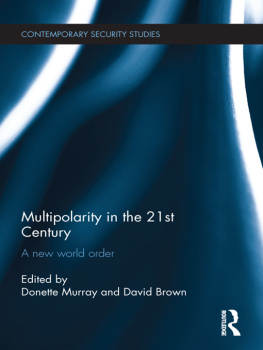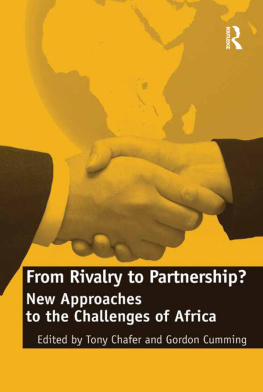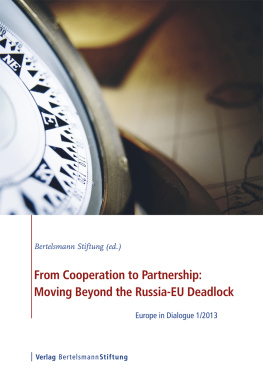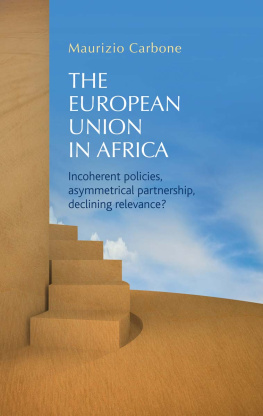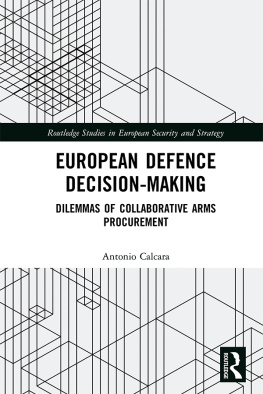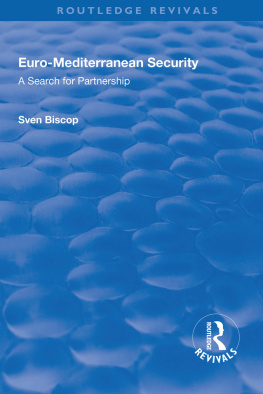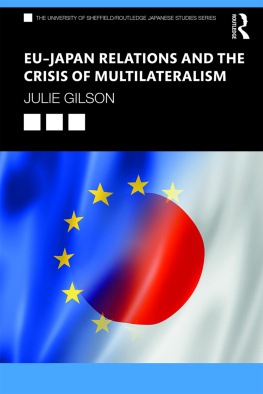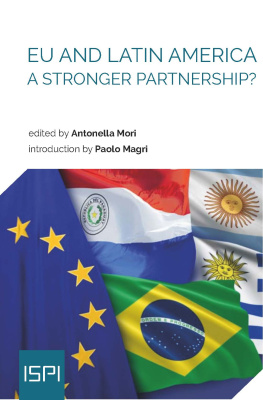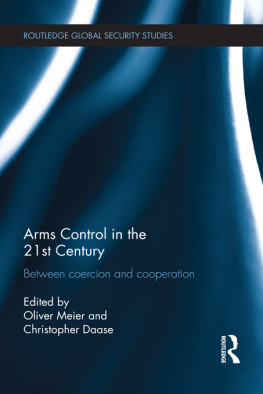
RIVALS IN ARMS
Human Dimensions in Foreign Policy, Military Studies, and Security Studies
Series editors: Stphanie A.H. Blanger, Pierre Jolicoeur, and Stfanie von Hlatky
Books published in the Human Dimensions in Foreign Policy, Military Studies, and Security Studies series offer fresh perspectives on foreign affairs and global governance. Titles in the series illuminate critical issues of global security in the twenty-first century and emphasize the human dimensions of war such as the health and well-being of soldiers, the factors that influence operational effectiveness, the civil-military relations and decisions on the use of force, as well as the ethical, moral, and legal ramifications of ongoing conflicts and wars. Foreign policy is also analyzed both in terms of its impact on human rights and the role the public plays in shaping policy directions.
With a strong focus on definitions of security, the series encourages discussion of contemporary security challenges and welcomes works that focus on issues including human security, violent conflict, terrorism, military cooperation, and foreign and defence policy. This series is published in collaboration with Queens University and the Royal Military College of Canada with the Centre for International and Defence Policy, the Canadian Institute for Military and Veteran Health Research, and the Centre for Security, Armed Forces, and Society.
1 Going to War?
Trends in Military Interventions
Edited by Stfanie von Hlatky and H. Christian Breede
2 Bombs, Bullets, and Politicians
Frances Response to Terrorism
Christophe Chowanietz
3 War Memories
Commemoration, Recollections, and Writings on War
Edited by Stphanie A.H. Blanger and Rene Dickason
4 Disarmament under International Law
John Kierulf
5 Contract Workers, Risk, and the War in Iraq
Sierra Leonean Labor Migrants at US Military Bases
Kevin J.A. Thomas
6 Violence and Militants
From Ottoman Rebellions to Jihadist Organizations
Baris Cayli
7 Frontline Justice
The Evolution and Reform of Summary Trials in the Canadian Armed Forces
Pascal Lvesque
8 Countering Violent Extremism and Terrorism
Assessing Domestic and International Strategies
Edited by Stfanie von Hlatky
9 Transhumanizing War
Performance Enhancement and the Implications for Policy, Society, and the Soldier
Edited by H. Christian Breede, Stphanie A.H. Blanger, and Stfanie von Hlatky
10 Coping with Geopolitical Decline
The United States in European Perspective
Edited by Frdric Mrand
11 Rivals in Arms
The Rise of UK-France Defence Relations in the Twenty-First Century
Alice Pannier
RIVALS IN ARMS
The Rise of UK-France Defence Relations in the Twenty-First Century
ALICE PANNIER
McGill-Queens University Press
Montreal & Kingston London Chicago
McGill-Queens University Press 2020
ISBN 978-0-2280-0355-7 (cloth)
ISBN 978-0-2280-0356-4 (paper)
ISBN 978-0-2280-0497-4 (ePDF)
ISBN 978-0-2280-0498-1 (ePUB)
Legal deposit fourth quarter 2020
Bibliothque nationale du Qubec
Printed in Canada on acid-free paper that is 100% ancient forest free
(100% post-consumer recycled), processed chlorine free
Library and Archives Canada Cataloguing in Publication
Title: Rivals in arms : the rise of UK-France defence relations in the twenty-first century / Alice Pannier.
Names: Pannier, Alice, 1988 author.
Series: Human dimensions in foreign policy, military studies, and security studies ; 11.
Description: Series statement: Human dimensions in foreign policy, military studies, and security studies ; 11 | Includes bibliographical references and index.
Identifiers: Canadiana (print) 20200277723 | Canadiana (ebook) 20200277855 | ISBN 9780228003564 (softcover) | ISBN 9780228003557 (cloth) | ISBN 9780228004974 (ePDF) | ISBN 9780228004981 (ePUB)
Subjects: LCSH: FranceMilitary relationsGreat Britain. | LCSH: Great Britain Military relationsFrance.
Classification: LCC UA700 .P36 2020 | DDC 355/.033041dc23
This book was typeset in 10.5/13 Sabon.
To all my friends and mentors (often the same)
Contents
Figures and Tables
FIGURES
TABLES
Foreword
Any observer of European international politics will be aware of two paradoxes: first, that while bilateral relations between governments are what stitch the system together, they are rarely subjected to detailed analysis or scholarly scrutiny; second, more particularly, that the two most significant powers of the region, France and the United Kingdom, are locked into a bilateral relationship which is at once interdependent, friendly, and deeply uneasy. Alice Panniers innovative study, rich in empirical detail and theoretical insight, is therefore much to be welcomed. It throws light on both the general phenomenon of bilateralism and the critical defence dimension of the entente between London and Paris.
It is generally presumed that any two states which talk of their special relationship will take each others concerns into account before focusing on others or on the wider system. But that does not lead sentiment to prevail over interests. It simply means that the understanding of shared interests sets a limit on the willingness to allow differences to escalate. On the other hand, even close allies take a transactional approach to specific arrangements which affect their foreign policy or their domestic stakeholders. No one gives presents in this business. Yet a fascinating question arises when states not only talk the talk of cooperation but also move to institutionalise it, as has happened since the Lancaster House agreements of 2010 between Britain and France: does institutionalisation lead to a convergence in the definition of interests to the point where it becomes difficult to act separately? This certainly happened after the Entente Cordiale of 1904, when structured if secretive military conversations effectively committed the UK to come to Frances aid in the event of a war with Germany.
Dr Panniers study shows that rather than any tendency towards diffuse reciprocity which would steadily deepen cooperation between the two partners, the norm is still that of seeking a quid pro quo at any given negotiating table. Bargains are not driven so hard as to produce constant breakdowns of trust, nor is there an insouciance about any possible deterioration in the relationship, but it is clearly true that such hopes as exist that France and the UK might be developing a closeness on defence equivalent to that between France and Germany on European integration, are premature. This is despite the logic deriving from the two countries parallel trajectories, as upper-middle-range powers coping with the loss of empire and ever-greater pressures on their resources.
Prima facie, it would seem inevitable that these two nuclear powers, still permanent members of the UN Security Council and head and shoulders above any other European state in terms of foreign policy ambition, should want to rise above parochial concerns so as to scale up their influence the same argument, indeed, on which the external actions of the EU itself rest. It might be faute de mieux but London and Paris do tend to see international relations through the same optic. They understand the difference between their roles and those of the US, China, and even Russia. They realise that history is moving against their privileged positions, and against Europe more generally, leading them to act whenever possible to promote not only a rule-based international system, but one where key flashpoints for conflict are defused and where any tendencies towards hegemony can be constrained. They are conservative powers, with a Burkean approach to change in the international system.
Next page
